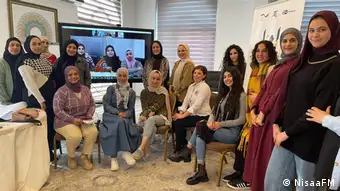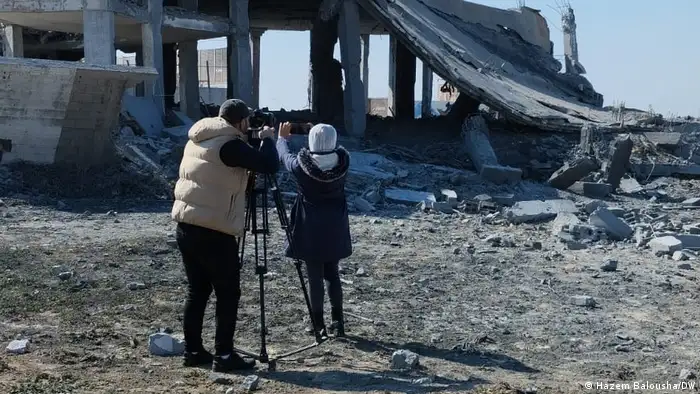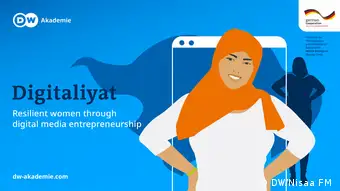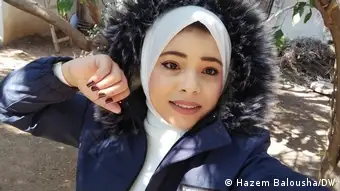Middle East/North Africa
A female journalist in Gaza needs a "strong personality and courage"
The project "EHNA", which in Arabic means "we," supports young female journalists just starting out in their careers, and namely under difficult conditions.
Studies, training, first job. For many young journalists, these are the traditional stepping stones in their careers. But how does this play out for young women in the Palestinian territories, in a male-dominated and hypercompetitive job market? And what specific skills are essential to a stable and successful career?
"EHNA", part of the DW Akademie project "Digitaliyat - Resilient Women through Digital Media Entrepreneurship," in cooperation with the local radio station Nisaa FM, answers these questions in an effort to support young women journalists as they build their careers. Twenty journalists were selected from among 180 applicants from the West Bank and the Gaza Strip to participate in the project. They have already obtained their bachelor's degrees in media studies or in comparable disciplines and are working toward careers in the media industry.
Male competitors and patriarchal structures
These young women face not only patriarchal structures and competition among their male counterparts, but also often a lack of understanding and support from their families and friends. Journalists have to travel a lot, often return home late and are vulnerable to numerous physical risks. According to Abeer Al Ghussein, one of the participants, "a woman needs to have a strong personality and show some courage. You need to love your work and show this love when working in a team. Being a female journalist in Gaza means that you challenge not only your family but the entire community."
The six-month program offers participants the chance to strengthen their reporting skills, develop their own media products and to find their own voices. EHNA is the first program of its kind in the Middle East and North Africa and includes training in constructive journalism, gender-sensitive coverage, data journalism and fake news.
Natascha Schwanke, Director of Media Development for DW Akademie, saw for herself what the program offers when she visited the region: "The program is an amazing chance for young women journalists in the region who have always wanted to build a media career," she said. "They learn basic journalism skills, but moreover, what it means to work as a woman in journalism and to continue to demand certain rights. This calls for bravery."
Podcasts, videos and print journalism take women's concerns into consideration
The participants put what they learned in the classroom into the field by producing their own TV, radio, print and online segments. Experienced journalists and editors from the Palestinian territories and the region mentored them along the way. These productions include podcasts on how women struggle against postpartum depression or delivering naturally made wigs to cancer patients, as well as videos on women’s soccer in the Palestinian territories, or gender stereotypes and linguistic discrimination in the Arabic language. A jury reviewed the finished products and handed out awards.

Twenty journalists were selected from among 180 applicants from the West Bank and the Gaza Strip to participate in the project
"What these young journalists, in such a short time, have managed to produce is truly impressive. For most of them, this was the first time they had worked with constructive journalism and gender-sensitive topics. It’s always exciting to see what such a program can do, and in this case, it’s been really successful. We hope that the participants can apply constructive journalism and women-focused skills while reporting from the Palestinian territories. There’s a need for that," said Kilian Schütze-Alinsky, DW Akademie Project Manager, Palestinian territories.
Abeer, the participant, also hopes to use the skills she’s learned.
"The podcast training helped me especially," she said. "Most people in podcasts talk about success. I want to focus on the suffering of people and in the end seek something that actually offers solutions to ease their suffering. So when I make new episodes, I will approach topics from different perspectives."
DW Akademie is leading the "EHNA" project together with Nisaa FM, which was founded in 2009 and is the first radio station in the Arab world led by women. The station emphasizes topics relevant to women and thereby focuses on contributing to societal change for the better. Nisaa FM supports women in their media careers so that they can work long-term in the profession, and is particularly encouraged by its popularity among namely women in the West Bank, East Jerusalem and Gaza. EHNA is financed by the German Ministry for Economic Cooperation and Development (BMZ) under the initiative "Transparency and Freedom of Opinion: Crisis Resilience in Media."
- Date 08.03.2023
- Author Nina Molter, Ole Tangen Jr
- Feedback: Send us your feedback.
- Print Print this page
- Permalink https://p.dw.com/p/4OOBL
- Date 08.03.2023
- Author Nina Molter, Ole Tangen Jr
- Send us your feedback.
- Print Print this page
- Permalink https://p.dw.com/p/4OOBL



